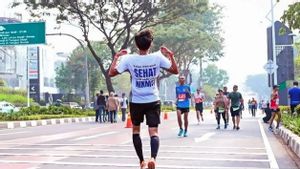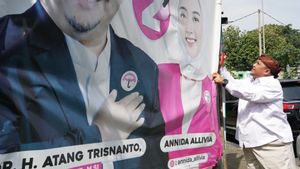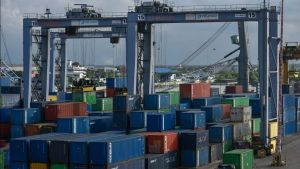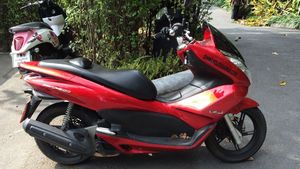JAKARTA Financial factors are the main reason why many Indonesians, especially those from rural poor families or urban slums with low levels of education, choose to work as migrant workers abroad.
They believe that the family's economy will improve because the wages earned from working abroad are much greater than in Indonesia. The wage for household workers in Malaysia alone can reach IDR 5 million. Meanwhile, in Indonesia, at least around IDR 2 million.
Inevitably, the number of Indonesian Migrant Workers (PMI) has never been below 200 thousand people in normal conditions according to data from the Indonesian Migrant Workers Protection Agency (BP2MI). This is what is recorded, the number of reality is thought to be far more than that.
However, that does not mean working abroad is more comfortable. Living away from the family is a challenge in itself, not to mention being entangled by rogue agents involved in trafficking in persons. Instead of being fun, the fate of migrant workers is even more miserable
Look at the case of Dede Asiah, a migrant worker from Karawang who is suspected of being a victim of trafficking in persons in Syria. Initially he was lured with a wage of Rp. 9 million per month as a household assistant in Turkey. However, upon landing in Istanbul, Dede as reported by BBCmalah was brought to Syria by a distribution company.
Dede works like a slave. He could only rest at 2 pm and wake up at six or seven in the morning. The wages given were not in accordance with the agreement.
Initially receiving a salary of Rp. 2.8 million. Two months of salary is eaten by agents," said Yongki Hamidun, Dede Asiah's husband, as reported by BBC News Indonesia on April 2.
After the caesarean health disorder also made him unable to work optimally. Meanwhile, to stop is also not easy because the employer has bought it from the dealer for almost Rp. 179 million for work for four years. Automatically, he must comply with the contract.
"Majikan saya bilang saya harus kerja di sini empat tahun, karena saya ini mahal," ujar Dede.
In 2021, migrant workers from Lebak Wangi, Serang, Banten with the initials SH will also experience a similar fate, becoming victims of fraud by rogue channeling agents. SH was initially promised to work as a household, but when he arrived in Dubai, he was instead made a Commercial Sex Worker (PSK).
Coordinating Minister for Political, Legal and Security Affairs Mahfud MD did not deny that these practices were still happening and threatening Indonesian migrant workers.
"The salary is not paid, the person is tortured. If you want to go home, you ask for money first and so on. The reason is that you have paid to the agent who sent it. 'You still have a debt'. Now this is what happens a lot," Mahfud said at the media center of the 42nd ASEAN Summit, Labuan Bajo, East Nusa Tenggara (NTT) on May 9.
In fact, Mahfud admitted that he had investigated the TIP syndicate in the Southeast Asia region. They generally send their victims by sea. Complementing victims with passports and inappropriate certificates.
"It can be 100-200 people in one shipment. I obtained this data from Mr. Romo Paschalis who did a very good advocacy for TIP victims," added Mahfud.
This is not a trivial matter. In the period-2017-2022, the Online Information System for the Protection of Women and Children (SIMFONI PPA) recorded that there had been 2,356 victims of the reported Trafficking in Persons (TPPO). With details of 50.97 percent of children, 46.14 percent of women, and 2.89 percent of men.
The number of victims has increased since 2019. From only 226 victims in 2019 to 422 victims in 2020, to 683 victims in 2021. Meanwhile, during the January-October 2022 period, 401 victims of the Trafficking in Persons (TPPO) were reported.
In fact, not only Indonesia, the trade practices of people have also infected all countries in the ASEAN region. If left unchecked, it will threaten peace, stability, and prosperity in the region. Also, hindering the community development process.
TIP crime is a serious and extraordinary crime involving humanity and the dignity of the nation.
On that basis, President Jokowi at the 42nd ASEAN Summit encouraged ASEAN leaders to declare a joint commitment to eradicate human trafficking. This crime must be eradicated completely from upstream to downstream.
"This is important and I deliberately propose it because the victims are ASEAN people and most of them are our Indonesian citizens," said the President at a press conference at the Meruorah Hotel, East Nusa Tenggara.
Alexis A. Aronowitz in the book 'Human Trafficking, Human Gallery: The Global Trade in Human Beings' explains that trafficking in persons is an act of recruitment, delivery, transfer, concealment and acceptance by means of threats, violence, coercion, kidnapping, fraud, deception, abuse of power or exploiting the victim's weaknesses.
The aim is sexual exploitation, prostitution, forced labor or forced slavery or the like and the collection of human organs.
Indonesia itself has actually paid serious attention to this, including by issuing Law Number 21 of 2007 concerning the Eradication of the Crime of Trafficking in Persons (TIP Law).
As an implementation, a number of other binding regulations have also been issued, such as Government Regulation Number 9 of 2008 concerning Procedures and Mechanisms for Integrated Services for Witnesses and/or Victims of TIP; Presidential Regulation Number 22 of 2021 concerning Amendments to Presidential Regulation Number 69 of 2008 concerning the Task Force for Prevention and Handling TIP; and Regulation of the Minister of PPPA Number 8 of 2021 concerning Standard Operational Procedures for Integrated Services for Witnesses and/or Victims of TIP.
However, eradicating it is not easy. It needs coordination, synergy, and concrete work from all stakeholders. This is because TIP is a planned crime and often involves individuals in government institutions.
Mahfud at the Coordination Meeting at the Ministerial Level of the PP TIP Task Force on December 28, 2022 admitted that. According to him, there are still many cases and types of TIP violations encountered in the realm of the Ministry of Law and Human Rights, especially through immigration and VISA affairs, "Where it is easier for TIP organizations and syndicates to issue people illegally."
Of course, it must be a common concern. It is time now not only to take action, but also to focus on prevention efforts. The hope is that with a joint commitment with ASEAN countries, cases of trafficking in persons can be minimized. The fate of migrant workers, especially those from Indonesia, can be guaranteed more.
The English, Chinese, Japanese, Arabic, and French versions are automatically generated by the AI. So there may still be inaccuracies in translating, please always see Indonesian as our main language. (system supported by DigitalSiber.id)









